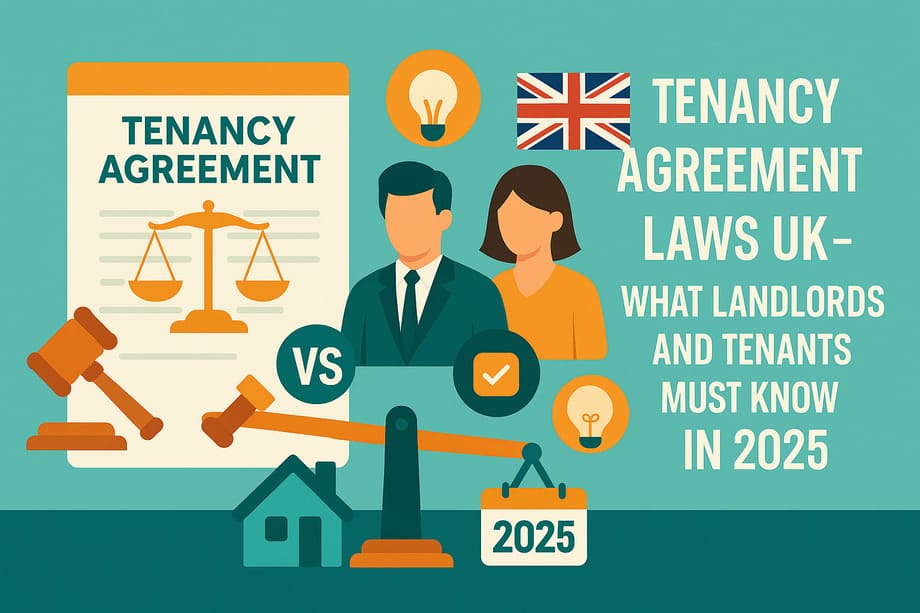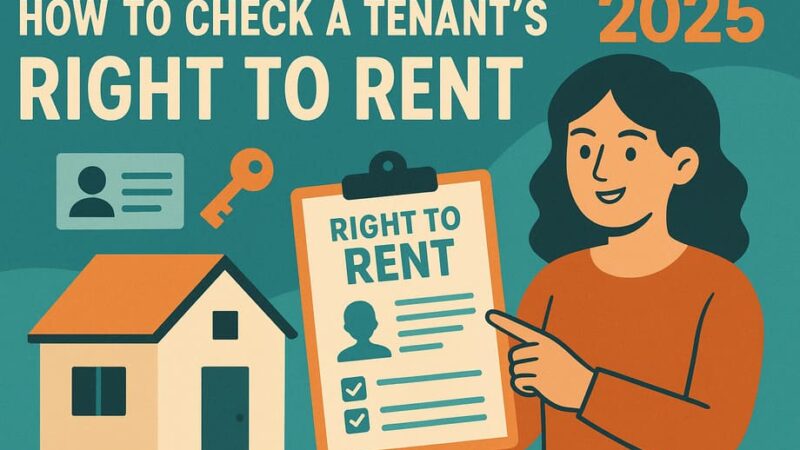Tenancy Agreement Laws UK – What Landlords and Tenants Must Know in 2025

The UK rental landscape is undergoing its biggest transformation in decades. With the Renters’ Rights Bill set to become law in 2025, both landlords and tenants face significant changes to tenancy agreements and rental laws.
Here’s the reality: The new legislation abolishes Section 21 “no-fault” evictions, ends fixed-term tenancies, and introduces stronger tenant protections that will fundamentally change how rental properties are managed in England.
Quick Summary: All Assured Shorthold Tenancies (ASTs) will become periodic tenancies, tenants get unlimited users and stronger rights, while landlords face stricter obligations but retain clear grounds for possession when legitimate reasons exist.
2025 Tenancy Laws: At a Glance
| Change | Current Law | New 2025 Law |
|---|---|---|
| Tenancy Type | Assured Shorthold Tenancy (AST) | Assured Periodic Tenancy |
| Fixed Terms | 6-12 month terms common | No fixed terms allowed |
| Section 21 Evictions | “No-fault” evictions permitted | Completely abolished |
| Tenant Notice | Tied to fixed term | 2 months’ notice anytime |
| Rent in Advance | Multiple months possible | Maximum 1 month only |
| Written Agreement | Not legally required | Mandatory requirement |
| Pet Policies | Blanket bans allowed | Must consider requests |
| Rent Increases | Various methods | Section 13 notice only |
What is the Renters’ Rights Bill 2025?
The Renters’ Rights Bill represents the most significant overhaul of England’s private rented sector in decades. Expected to receive Royal Assent in late 2025, it will transform the relationship between landlords and tenants across England.
Key objectives:
- Abolish no-fault evictions to provide tenant security
- End discriminatory practices against benefit recipients and families
- Introduce stronger property standards
- Create a fairer, more balanced rental market
Implementation timeline: The Government expects a “big bang” implementation in early 2026, with all tenancies converting to the new system on a single date.
End of Fixed-Term Tenancies: The Biggest Change
What’s Changing
Assured shorthold tenancy agreements (ASTs) will disappear and every tenancy will become periodic. Landlords will no longer be able to require a minimum initial commitment term (commonly six or 12 months).
For existing tenancies: When the legislation comes into effect, any pre-agreed ‘option to renew’ or ‘break clause’ within an existing tenancy agreement will no longer apply.
For new tenancies: Creating fixed-term contracts will become a legal offence, with fines up to £7,000 for non-compliance.
How Periodic Tenancies Work
What “periodic” means: Tenancies will run from month to month until either the tenant serves notice, or the landlord meets one of the grounds for regaining possession of the property.
Key features:
- No set end date
- Rolling monthly or weekly agreements
- Tenants can give two months’ notice at any point from day one
- Landlords must use Section 8 grounds for possession
Section 21 Abolished: New Eviction Rules
The End of No-Fault Evictions
Section 21 notices are being abolished, meaning landlords no longer have a ‘no fault’ option to regain possession of their property. This change aims to provide tenants with greater security and prevent retaliatory evictions.
New Section 8 Grounds for Possession
Landlords must now rely on clearly-defined grounds under Section 8 to regain possession. The most commonly used grounds include:
Ground 1 (Amended): Landlord or family wants to occupy the property
- Minimum 4 months’ notice required
- Cannot be used within first 12 months of tenancy
- Must prove genuine intention to occupy
- 12-month restriction on re-letting if notice served but not used
Ground 1A (New): Sale of property
- Minimum 4 months’ notice required
- Cannot be used within first 12 months of tenancy
- Must market property for sale and complete sale
- 12-month restriction on re-letting if notice served but property not sold
Other grounds include: Rent arrears, anti-social behaviour, breach of tenancy terms, and property needed for redevelopment.
Important: Unlike Section 21 procedures, all possession cases will now require a court hearing where grounds must be proved before an order can be made.
Tenant Protection Measures
The 12-Month Protected Period
During the first 12 months of any new tenancy, landlords will not be allowed to:
- Move back into their property (Ground 1)
- Attempt to sell it (Ground 1A)
- Use these grounds for possession
Exception: Landlords can sell to another landlord who will take over the tenancy.
Tenant flexibility: Tenants can still serve notice to terminate during this protected period.
Stronger Notice Requirements
- Tenant notice: 2 months’ notice required, aligned with rent payment dates
- Landlord notice: Varies by ground (2-6 months depending on circumstances)
- Annual rent increases: Only via Section 13 notice with 2 months’ warning
Rent and Financial Protections
Maximum Rent in Advance
One month’s rent will be the maximum amount that can be required up front. Landlords will no longer be able to ask for several months’ rent in advance.
Key restrictions:
- No rent payment before tenancy agreement signed
- Maximum 1 month’s rent (or 28 days for shorter periods)
- Tenants remain free to pay early if they choose
- Landlords cannot enforce advance payment terms
Rent Increase Limitations
New rules for rent increases:
- Only once per year via Section 13 notice
- Must align with current market rates
- Contractual rent review clauses banned
- Tenants can challenge increases without risk of higher rent being imposed
Tenant protection: Under the new system, First-Tier Tribunals cannot raise rent beyond the landlord’s proposed amount, removing financial risk for tenants challenging increases.
Mandatory Written Agreements
New Legal Requirement
Written tenancy agreements will become legally mandatory for all tenancies. Currently, most tenants do not have a right in law to a written tenancy agreement, but this will change.
What landlords must provide:
- Written statement of terms before tenancy begins
- Clear outline of rights and responsibilities
- Compliance with new legal requirements
- Templates that meet 2025 standards
Essential Terms in 2025 Agreements
Must include:
- Names of all parties
- Property address and description
- Rent amount and payment schedule
- Deposit details and protection scheme
- Repair and maintenance responsibilities
- Notice periods and termination procedures
- Pet policy (cannot be blanket ban)
Cannot include:
- Fixed-term commitments
- Advance rent payment requirements
- Discriminatory clauses against benefits or children
- Unfair terms that give tenants fewer rights than statutory minimums
Property Standards and Safety
Awaab’s Law Extension
Following the tragic death of young Awaab Ishak, statutory timeframes for responding to serious hazards like damp and mould are being extended to private landlords.
Requirements:
- Specific time limits for addressing health hazards
- Terms automatically implied into all tenancy agreements
- Tenants can sue for breach of contract if landlords fail to comply
- Courts can order remedial action and/or compensation
Decent Homes Standard
The Decent Homes Standard, previously limited to social housing, will now apply to private rentals.
Key requirements:
- Properties must meet minimum health and safety standards
- Adequate heating and insulation
- Modern facilities and reasonable state of repair
- Free from serious health and safety hazards
Energy Performance Requirements
Current requirements (2025):
- Minimum EPC rating of Band E
- Valid for 10 years
- Must be provided before tenancy begins
- Future proposals for Band C by 2030 under consultation
Anti-Discrimination Measures
Protected Groups
It will be illegal for landlords to refuse tenants based on:
Benefit recipients: “No DSS” policies are explicitly banned
Families with children: Cannot refuse unless property genuinely unsuitable (e.g., one-bedroom flat for family with multiple children)
What landlords must do:
- Consider applicants on individual circumstances
- Make case-by-case decisions with evidence
- Ensure decisions are proportionate and justified
Pet Policy Changes
Current: Landlords can include blanket “no pets” clauses
New 2025 rules:
- Tenants have right to request pets
- Landlords cannot unreasonably refuse
- Valid reasons for refusal: head lease restrictions, property size, severe allergies
- Pet insurance can be required to cover damage
New Oversight and Enforcement
Private Rented Sector Database
All landlords must register on a new national database:
- Helps landlords understand legal obligations
- Provides compliance information to tenants
- Supports council enforcement targeting
- Required for using certain possession grounds
Private Rented Sector Ombudsman
Mandatory membership for all private landlords:
- Free service for tenant complaints
- Binding resolution powers
- Can order apologies, remedial action, or compensation
- Alternative to costly court proceedings
Enhanced Council Powers
Stronger enforcement measures:
- New investigatory powers
- Increased penalties: £7,000 for minor breaches, £40,000 for serious violations
- Enhanced Rent Repayment Orders with doubled penalties
- Better targeting of non-compliant landlords
What Landlords Must Do Now
Immediate Actions (2025)
- Review existing tenancy agreements for compliance with new rules
- Prepare for periodic tenancies and understand Section 8 grounds
- Ensure properties meet current standards (EPC Band E minimum)
- Update pet policies to allow reasonable requests
- Register for required schemes when databases become available
Financial Preparation
- Adjust cash flow models for potential increased turnover
- Budget for property improvements to meet Decent Homes Standard
- Review rent levels against local market rates
- Plan for potential void periods during transition
Documentation Requirements
- Ensure all agreements are in writing from 2026
- Keep detailed records of property maintenance and communications
- Document any possession ground requirements with evidence
- Maintain compliance certificates (EPC, gas safety, electrical safety)
What Tenants Need to Know
Your New Rights
Enhanced security:
- No more no-fault evictions
- 12-month protection from sale/occupation grounds
- Stronger challenge rights for rent increases
- Right to request pets
Financial protections:
- Maximum one month’s rent in advance
- Protection from rental bidding wars
- Clearer rent increase procedures
Your Responsibilities
Notice requirements:
- 2 months’ notice to end tenancy
- Notice must align with rent payment dates
- Written notice still required
Property care:
- Maintain property in tenant-like manner
- Report repairs promptly
- Provide access for necessary work
- Comply with reasonable tenancy terms
Regional Variations and Exemptions
What’s Covered
The Renters’ Rights Bill applies to:
- All Assured Shorthold Tenancies in England
- Both new and existing tenancies
- Private individual landlords and companies
What’s Exempt
Not covered by the new rules:
- Company lets
- Tenancies with rent over £100,000 per year
- Certain agricultural tenancies
- Long leases and service occupancy agreements
- Student accommodation in some circumstances
Scotland and Wales
Important: These changes apply to England only. Scotland and Wales have separate rental legislation and different timelines for reform.
Timeline and Implementation
Current Status (2025)
- Bill has completed major parliamentary stages
- Royal Assent expected autumn 2025
- Implementation planned for early 2026
- Staged implementation for different measures possible
Key Dates to Watch
Late 2025: Royal Assent expected Early 2026: “Big bang” implementation likely Ongoing: Consultations on specific standards and regulations
Looking Ahead: Future Changes
Potential Additional Reforms
Under consultation:
- Decent Homes Standard details
- Lifetime deposit schemes for tenant mobility
- Enhanced EPC requirements (Band C by 2030)
- Further anti-discrimination measures
Industry Preparation
Professional landlords and agents are already preparing for these changes by:
- Updating processes and documentation
- Training staff on new requirements
- Investing in property improvements
- Developing new tenant relationship strategies
The Bottom Line for 2025
The Renters’ Rights Bill represents a fundamental shift towards tenant protection and security while maintaining legitimate landlord rights through clear legal grounds for possession.
For landlords: Focus on compliance, property standards, and building positive tenant relationships. The changes favour professional, responsible landlords who provide quality accommodation.
For tenants: Enjoy greater security and protection while understanding your increased responsibilities in longer-term tenancies.
For both parties: The emphasis shifts from short-term arrangements to sustainable, long-term tenancies that work for everyone involved.
Our template is designed to comply with current UK tenancy laws and will be updated to reflect all new requirements as they come into force, ensuring you stay compliant throughout the transition period.
Frequently Asked Questions
When do the new tenancy laws come into effect?
The Renters’ Rights Bill is expected to receive Royal Assent in late 2025, with implementation planned for early 2026. The Government has indicated a “big bang” approach where all tenancies convert to the new system on a single date, though some measures may be phased.
What happens to my existing fixed-term tenancy agreement?
All existing Assured Shorthold Tenancies will automatically become periodic assured tenancies when the new law takes effect. Any pre-agreed break clauses or renewal options will become invalid, and the tenancy will continue on a month-to-month basis until proper notice is given.
Can landlords still evict tenants under the new system?
Yes, but only using Section 8 grounds with legitimate reasons such as rent arrears, anti-social behaviour, wanting to sell the property, or moving back in. Landlords must prove their case in court and cannot use these grounds within the first 12 months except in cases of serious breaches.
How much rent can landlords ask for in advance?
Under the new rules, landlords can only require a maximum of one month’s rent in advance, and only after the tenancy agreement has been signed. They cannot ask for or accept rent payments before the tenancy begins or require advance payments beyond one month.
Are written tenancy agreements mandatory from 2025?
Yes, written tenancy agreements will become a legal requirement under the new legislation. Landlords must provide written terms to all tenants, whereas currently this is only required for social housing tenants or upon request for private tenants.
Can landlords still refuse pets completely?
No, blanket “no pets” policies will be banned. Tenants will have the right to request permission for pets, which landlords cannot unreasonably refuse. Valid reasons for refusal include head lease restrictions, property being too small for the pet, or documented severe allergies. Landlords can require pet insurance.
What are the penalties for non-compliance with new tenancy laws?
Penalties vary by breach type. Minor or initial non-compliance can result in fines up to £7,000, while serious, persistent, or repeat violations can lead to penalties up to £40,000 or criminal prosecution. Creating illegal fixed-term agreements specifically carries fines up to £7,000.
How do rent increases work under the new system?
Landlords can only increase rent once per year using a Section 13 notice, which must give tenants at least 2 months’ warning. Contractual rent review clauses will no longer be valid. Tenants can challenge increases through tribunals without risk of the tribunal imposing a higher rent than proposed.
Do these changes apply to all UK rental properties?
No, the Renters’ Rights Bill applies only to England. The changes cover all Assured Shorthold Tenancies, including new and existing tenancies, but exclude company lets, tenancies with rent over £100,000 per year, and certain specialized accommodations. Scotland and Wales have separate rental legislation.
What should landlords do to prepare for these changes?
Landlords should review existing agreements for compliance, understand Section 8 possession grounds, ensure properties meet current standards (minimum EPC Band E), update pet policies, prepare for mandatory registration schemes, and adjust financial planning for potential increased tenant turnover and property improvement requirements.
Last Updated on September 16, 2025 by James Cartwright







